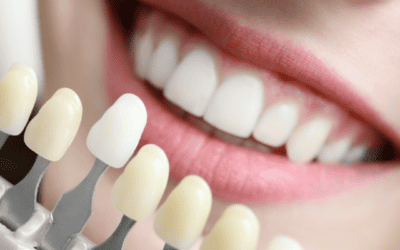We’ve been busy making splints for tooth grinding these past few weeks, which got me wondering how many of us suffer from this condition? I looked up the literature on bruxism (the medical term for tooth-grinding) to find out. The answer? It varies a lot depending on where and who they are studying. Some studies say it’s between 5% – 8% in the general population, another study found over 30% of its subjects were grinding away at their teeth. So rather than give you the scientific data, I’m going to give you my personal story.

Mishari having impressions for his splint
Headaches, earache, jaw pain, sore neck…
I suffered terrible headaches and facial pain when I was studying at university. So bad that I’d have to go home early and lie down in a dark room. No pain relief seemed to help. Luckily, I was studying in a dental hospital, and when one of our instructors asked why I was leaving early, she diagnosed me with TMD.
TMD (Temporo-mandibular Disorder) covers a range of disorders of the jaw joint and the muscles which support it. It can arise from many causes acting together, but mostly it is due to overuse of the joint and muscles. This is caused by:
- Clenching and/or grinding the teeth (bruxism) – this can be brought on by worry, when concentrating or when you are extra busy, or other causes such as sleep disorders.
- Straining the joint and muscles by, for example, biting fingernails, holding a pen between your teeth, excessive yawing or biting into large foods, eg. apples, burgers.
- Overuse of the joint, eg. chewing gum.
Tooth grinding/bruxism
Bruxism can be caused my many things and unfortunately we can’t just stop ourselves from grinding/clenching our teeth. There is also a difference between day-time bruxism and doing it during your sleep, when it may be related to airway &/or sleep disorders. Back when my problems began, over 10 years ago, the treatment I was given was a soft mouthguard. Well, that just made things worse. I was clenching my teeth even more! I gave up wearing it, finished university, and the headaches and tooth grinding subsided.
What can you do?
I’d have flare-ups every so often, but usually could keep it in check with the following:
- Deal with stress – exercise works well for me. I’ve tried meditation, but my mind won’t be quiet! Maybe you could try yoga, long walks, reading a good book or a warm bath.
- Avoid foods which involve a lot of chewing – I gave up chewing gum. I don’t eat burgers, chewy lollies or anything similar.
- Heat – if I feel it coming on, a warm towel to the face can work wonders
- Jaw exercises – there are many. A physio or dentist can show you.
- Being aware of it and making an effort to keep my teeth apart at rest.
What can happen?

Mishari checking my teeth for signs of toothwear, chipped or broken teeth.
I have seen many patients destroy their teeth from an undiagnosed or untreated grinding habit. The teeth can chip and wear away over the years, getting shorter and shorter. The teeth and jaws move over this time to compensate, and ultimately when left late it is so much more complicated to try and fix, often requiring specialist input. Some people completely split the teeth which then must be removed.
Lately, my bruxism has returned, and unfortunately this time I’ve chipped a tooth. I asked Mishari to make me a splint.
A splint is a hard plastic covering that goes over the teeth – it prevents the teeth from coming together in the usual way. It can help by holding the jaw in a slightly different position, but mainly by stopping the teeth rubbing together it prevents them from breaking, chipping, wearing away and ultimately cracking. As it is a hard and smooth plastic, I won’t have the same problems as I did with my first mouthguard.
What does the dentist do?
At the first appointment the dentist will check for signs for tooth wear and examine the jaw joints. Some patients are sent for x-rays or other imaging of the jaw joints if other problems are suspected. If a sleep disorder is suspected, they will be referred to a sleep physician.
If just a straightforward hard splint is recommended, it’s as simple as two impressions of your teeth and a record of how the teeth bite together.
More than just teeth…
If you are suffering from similar problems, please get it checked. It’s easier (and cheaper) to sort these things out sooner rather than later. If you also grind your teeth, snore and/or suffer from excessive day-time sleepiness, I urge you to get checked for obstructive sleep apnoea. Please see this article by Dr McIntosh about the links between bruxism and airway obstruction.
In addition, if you have kids who snore frequently and/or grind their teeth – get it checked as it could be a sign of an airway problem (tonsils, adenoids, deviated septum, narrow palate, sleep disorder etc). We will cover more in future blogs.
I’m hoping my splint will be ready next week. I’ll keep you updated on how it goes.


